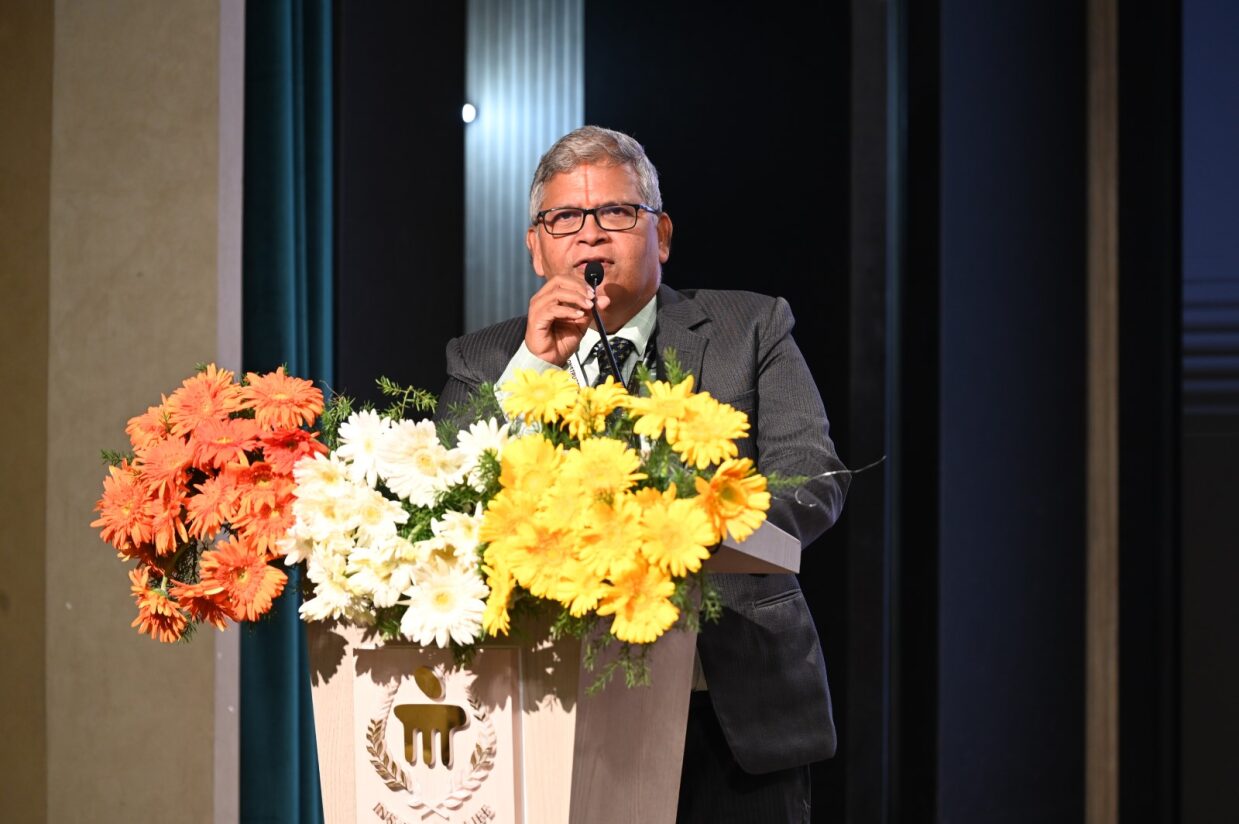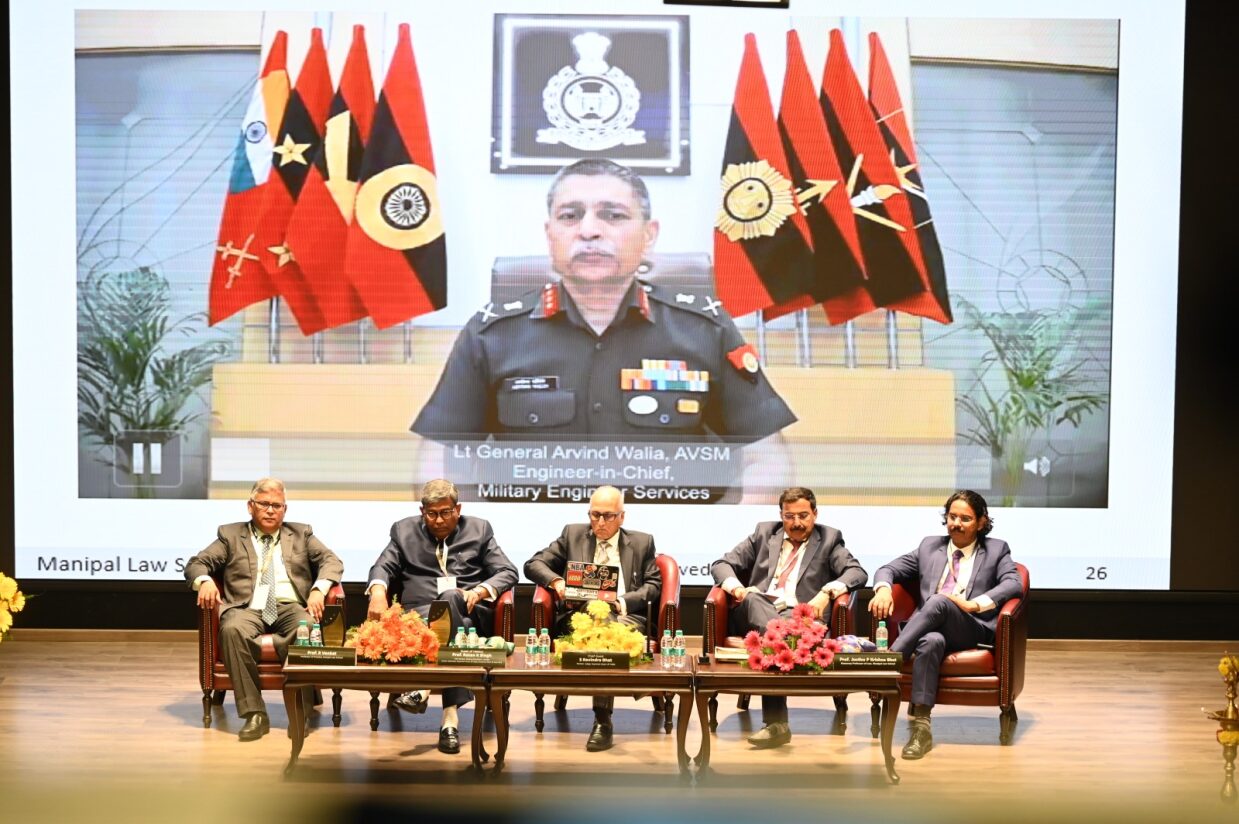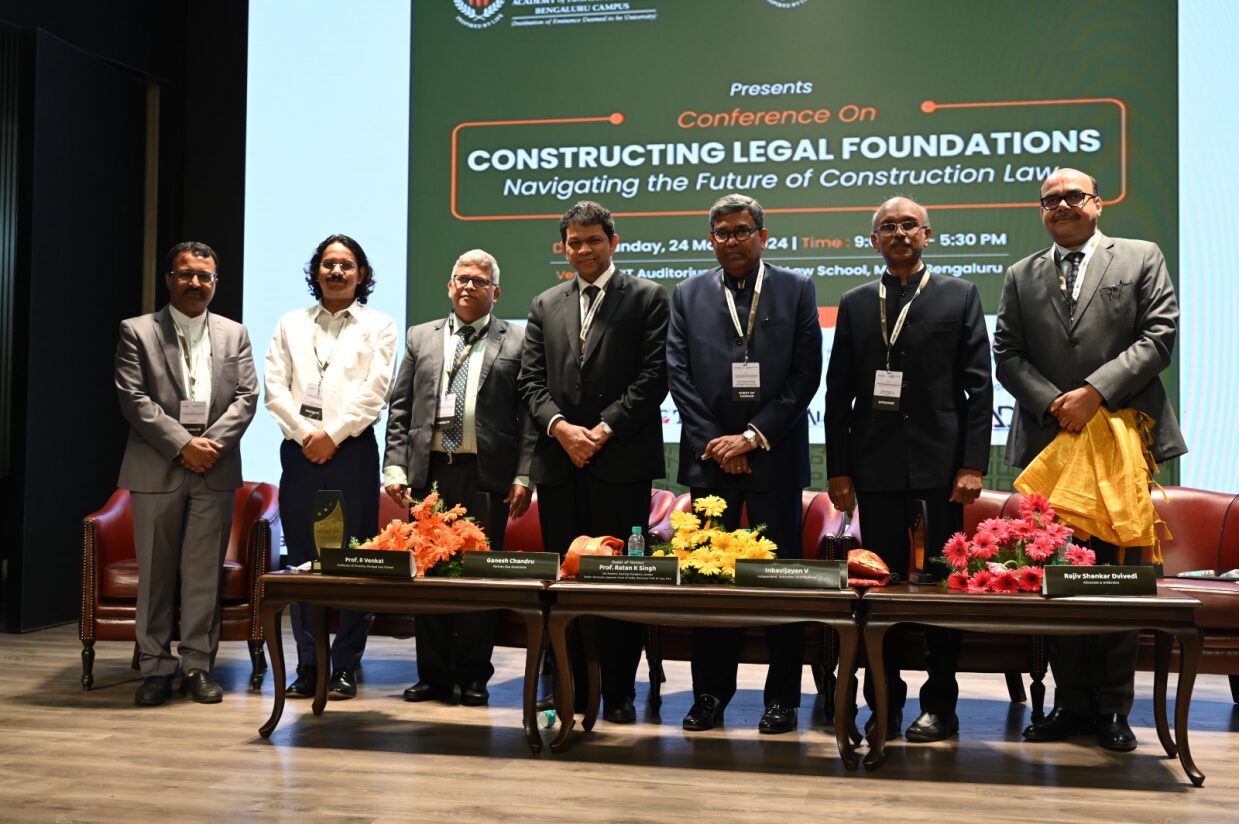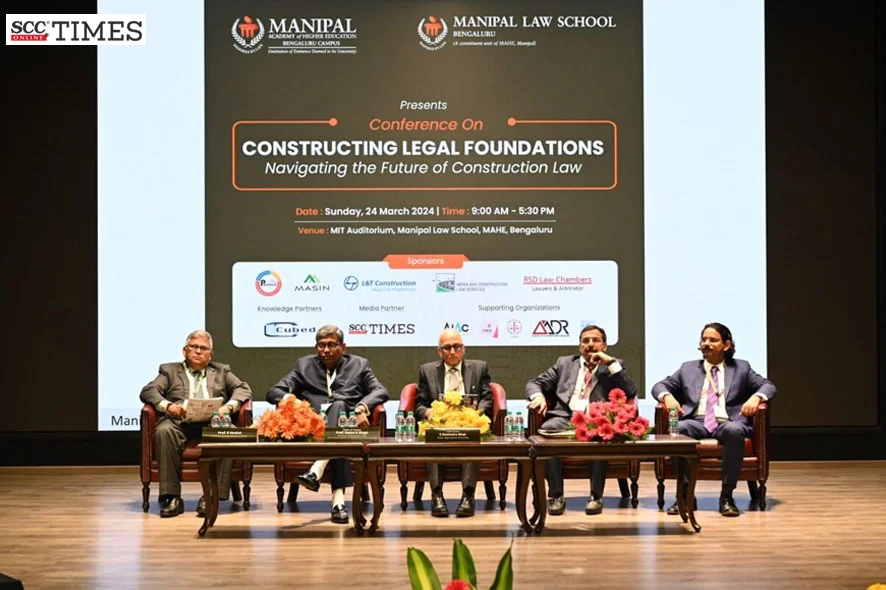Manipal Law School, Bengaluru has conducted its maiden conference on the theme of construction law on the 24th of March 2024. The main purpose of the conference was to explore the key contractual and legal issues impacting the construction and infrastructure sector in the country.
Titled as “Constructing Legal Foundations: Navigating the Future of Construction Law” this conference has attracted eminent professionals, practising lawyers and academicians from India, UK, Singapore, and Malaysia. Justice S Ravindra Bhat, retired justice from Supreme court of India was the chief guest of the conference. Senior advocate and international member at Keating Chambers, UK Prof Ratan Singh and Lt Gen Arvind Walia, AVSM, Engineer-in-Chief, Military Engineer Services were the guests of Honour of the conference.
The proceedings have commenced around 9.30 AM in the morning. Prof R Venkat, Professor of Practice and conference convener has set the tone of the conference explaining the importance of construction law given the infrastructure boast that is happening in our country. He has explained how academic institutions in UK and USA have commissioned construction law specific Master level programs in the middle of 1980’s and such a specialized program is being commissioned at Manipal Law School from the current academic year (2024). He has further emphasised that the forthcoming Master program in construction law and arbitration is available not only for legal professionals but also for construction engineers (non-legal professionals) as LLM (Professional).
Prof Venkat has introduced his professor and mentor William Mclaughlin (Bill) who was his tutor at Robert Gordon University, UK during his LLM program and due to advanced age (84) Bill could not travel to attend the conference but has sent an audio clip highlighting the role of academic institutions in promotion of construction law as specialisation.

The director of Manipal Law School Prof (Dr) Avinash Dadhich spoke on the role of academic institutions in not only educating the students with academic subjects but also assisting the industry in upskilling the professionals in areas where specific skills are required. He had explained how Manipal Law School has positioned themselves as a unique institution in offering master level programs in data privacy, cyber security, information technology and now construction law streams which are first time in the country.
Prof Ratan K Singh has spoken about evolvement of construction law as a distinct legal profession and highlighted the role of Society of Construction law globally. He has emphasised the various initiatives taken by the SCL including arranging conferences with eminent practitioners from various jurisdictions and reminded the audience of the recently concluded SCL conference in the month of December at New Delhi. He further emphasized on the steps India need to take in developing efficacious Construction Arbitration regime at par with the best in the world.

Lt. General Arvind Walia, AVSM, Engineer-in-Chief, Military Engineer Service graced the Conference as Guest of Honour emphasised on need for capacity building for handling large numbers of disputes in view of unparalleled growth of Infrastructure sector in India. He underscored the role of Military Engineer Services, a construction wing under Ministry of Defence, in building strategic infrastructure in the country. He applauded Manipal Law School’s academic initiatives in the field of construction law. He emphasised that need of the hour is to reduce the time taken in resolution of disputes, capacity building and Industry-academia collaboration.
Then the Chief Guest of the conference Justice S Ravindra Bhat delivered his keynote speech. He has congratulated MLS for taking the initiative of promoting legal education in niche areas and declared that the Masters program in construction law is the need of the hour and expressed his appreciation for the construction law research centre initiative for promoting legal research and education.
Hon’ble Justice S Ravindran Bhat, Former Judge, Supreme Court of India graced the occasion as Chief Guest. Hon’ble Justice Bhat in his address applauded Manipal Law School for starting LL.M. in Construction Law Programme. He has mentioned that during 1980s’ there were very few Engineer Lawyers; but it is heartening to note numbers have been increasing drastically in the recent times. His Lordship also emphasised on the need for developing a special pool of Construction Arbitration practitioners in India considering the rapid evolution of the India construction Industry. He further stated that sound grounding in Constitutional law is necessary and this could be considered as part of curriculum.
Prof Justice Krishna Bhat delivered the vote of thanks for the inaugural session and he has shared his association with the Manipal Law School and how the institution strives hard to be unique in curating new courses and delivering them with eminent industry professionals.
After the inaugural session, the technical sessions have commenced. Out of planned four sessions, two sessions were held in the morning and two post lunch. The sessions conducted were on the following themes.
- Navigating the Procurement Puzzle: This panel will delve into the various procurement methods used in construction projects and their implications for project delivery and risk allocation.
- Mastering Contract Administration: Attendees will gain insights into effective contract administration strategies, including key provisions, change order management, and performance monitoring.
- Unravelling Construction Claims Strategies for Prevention: This panel will explore strategies for preventing construction claims through effective project management and dispute avoidance mechanisms.
-
Dissecting Disputes; A Legal Road Map: The final panel will provide attendees with a legal road map for handling construction disputes, including dispute resolution clauses, claims and counterclaims, and expert evidence.
Session 1 summery
Ganesh Kabi was the moderator of this session.
Hasit Seth spoke on renegotiation clauses in construction contracts. He has mentioned that the since the construction contracts are complex and often long term, renegotiating mechanisms are best built into the Contracts. Long-term contacts in the Public-Private Partnership (PPP) sphere like Build-Own-Transfer (BOT) and Build-Own-Operate-Transfer (BOOT) contracts have developed several renegotiation models. the World Bank, Asian Development Bank (ADB) and National Highway Authority of India (NHAI) contract forms were used to illustrate renegotiation models.
Badrinath Srinivasan spoke on the risk of drastically altering the particular conditions when using Standard form of contracts like FIDIC which could lead to ambiguities and disputes. He has quoted a Singapore case law wherein the deletion of DAB clause was replaced by a bespoke dispute resolution clause which stated amicable settlement followed by arbitration. The ambiguity as to whether the stage of amicable settlement was condition precedent to arbitration led to disputes between parties on the issue and costs incurred were more than SGD 1 million on resolving the issue.
Ajay J Nandalike spoke on Unfair contract terms in engineering contracts and risk allocation. He stated that unfair terms place unreasonable burden on a Party in exercising their contractual rights otherwise available in a fair contract. If the unfair terms are affecting the operational aspects for example, say no cost compensation in the event of extension of time, then the contractor were to give notice of any such breach and say that unless or until this particular term is not modified, the contractor will not carry out the contractual obligation, the contractor would be entitled to claim losses. He has quoted law Commission reports, the 103rd and the 199th have both held that there is a necessity to impose some kind of protection against unfair terms of contract and stated that the Courts have the power to hold whether a clause is unconscionable or not and guidelines for this have been provided.
Dr. S. Pradeep Reddy spoke on the Sub-Contracts & Consultancy Contracts
Since the subcontracts are generally drafted as a back to back contract in line with the main contract, there are grey areas and subject to interpretation. He highlighted that if an arbitration clause is incorporated into the sub-contract in a back to back contract by virtue of the main contract containing an arbitration clause, is also a point is issue and may not be held so, particularly in Indian jurisprudence. In Consultancy Contracts, the limit on the liability of the consultant and the duty of care required by the consultant were discussed, which is generally not the fit for purpose obligation. There may be conflict of interest and overlapping issues of liability in consultancy contracts vis-à-vis the main contract, which need to be addressed.
Session 2 summary
Hasit Seth was the moderator of this session
Ganesh Kabi, spoke on the importance of extension of time and liquidated damages provision in construction contracts. He highlighted how EOT preserves the right of Employer to claim liquidated damages and also saves the contract from discharge and its continuance in certain contingencies. He cautioned that the Owners are not permitted to operate EOT clause to fix the date from which liquidated damages would run retrospectively. Kabi further enlightened the audience how liquidated damages is dealt with under Indian Contract Act 1872 as the courts have interpreted that no liquidated damages could be claimed if there is no loss is suffered (section 74) which is again like Section 73 dealing with unliquidated damages. The measure of damages in each case is only reasonable compensation. Also, loss must be proved, whenever it is possible to prove it. However, in case it is found to be a genuine pre-estimate of loss provided in the contract and it is impossible or difficult to prove the loss, LD can be allowed without the requirement of proving the quantum of loss.
Sampath Raman spoke on the topic of “Progress, completion, Interim and final payment in construction contracts; An international perspective”
Construction projects require a balance of management efforts and strict administration of contracts. He highlighted the importance of Contract programs and its consent by the Engineer/Contract Administrator.Letter of Acceptance /Contract needs to define date of commencement and incorporate provisions for extension of time in the event of delay events such as late receipt of NOCs & access to site etc.
He further emphasised the importance of collaborative efforts required between Employer and Contractor to discuss and agree methods to improve cashflow. Provisions shall include cost loaded programme, on account payments for pending variations, material offsite, price escalation etc. Contracts need to incorporate sufficient clarity on sectional completion and taking over in parts, including provision for early access for hospitality projects.
Dr. Sridhar Mothe spoke on the topic of “Managing Variations and Changes in Different types of Contracts”
He highlighted how variations in Infrastructure contracts are one of the contentious issues in administering the contracts. Some causes for variations might be variance in preliminary design to detailed design, changes in owners’ requirements, additional scope, ineffective planning etc. The variation clauses incorporated in contracts are advantageous to both employer and contractors. While for employers it gives the authority to order variations which the contractor is bound to execute, for contractors the clause is good because it stipulates the valuation i.e. how payments made. He further emphasised the difficulties in quantifying and agreeing a valuation for variation in EPC contracts. The hierarchy or precedence stipulated in contract of various parts of documents forming part of the contract , rules of interpretation of contracts are used to judge whether a particular job or work qualifies as a variation under the contract.
Lakshmanan spoke on the role of Artificial Intelligence in Contracts Management and Dispute Resolution.
With the rapid advancement of technology, we (read as L & T) have witnessed an exponential growth in automation, leading to the widespread adoption of AI. From a contractor’s perspective, AI finds its applications across various sectors such as Construction, BIM, Forensic Delay Analysis, Risk Management, Contracts Management, and Dispute Resolution. While these domains share common challenges, some present unique hurdles. As a construction organization, we have embraced a variety of available tools like Wrench, etc., and have crafted several chatbots and dashboards utilizing the wealth of data at our disposal. Previously, the concept of dispute resolution was predominantly post-project completion. However, recent trends indicate a shift towards resolving disputes during project duration, through mechanisms like Dispute Adjudication Boards (DABs), amicable settlements, and arbitration initiation. Emerging trends highlight the integration of AI in Contracts Management and Dispute Resolution, aiming to bridge these interdependent domains.
Nitya Bansal’s presentation focussed on the source of data basis which such solutions are developed. She emphasized that to build a pool of relevant, reliable and wholesome data there is greater need for collaborative software solutions for both project management and dispute management. AI based solutions developed from data sourced from collaborative software will make such solutions much more effective and universally applicable. She also shared the difference between solutions that merely enable collaboration between team members and those which enable collaboration across stakeholders.
Pradeep Mokshagundam highlighted how contract Administration plays a vital role during the execution of the project for all parties involved. He lamented that unfortunately, this area is most neglected due to the “I know everything syndrome” since there is no integration amongst all the stakeholders & the relevant data / information.
Pradeep stressed upon the importance of using competent resources including technology to bridge the gap, along with giving numerous recommendations including use of lessons learnt, utilizing peer reviews, utilising internationally acceptable best practices / guidelines, etc in order to effectively analyse the data / information for minimizing flaws that lead to disputes, which are time consuming and costly affairs.
Anirudh Krishnan spoke on the termination and suspension provisions in construction contracts. He has used the Indian Contract Act provisions as a base for termination under law and FIDIC and CPWD contracts for termination and suspension under the Contract. He has given examples of several case laws to highlight how courts interpret the provision of termination and suspension in the contracts.
Session 3 summery
The session 3 titled “Unravelling Claims: Strategies for Prevention and Resolution” was moderated by Mr. Ratan K Singh. Mr. Julian Bailey spoke on Notices and time bars, its legal effect with focus on Middle East and India in view of recent judgements. Mr. Ronak Desai, spoke on breaches by Employer including Delay in handing over of site, utility diversion, environment clearance, belated approvals, and resultant Claims arising out such breaches by the Employer. Mr. Jon Prudhoe, Delay & Quantum Expert witness spoke about role of expert in Arbitration from Expert’s perspective with emphasis on Experts’ overriding duty to the tribunal and independence of Experts. Datuk Sundra Rajoo, elucidated the role of an Expert from Arbitrator’s perspective. He laid out the role of Expert Witness in construction Arbitration relying upon various judgements. Mayank Singh Thakur spoke about delay analysis and quantum analysis. Mr. Tejas Karia, spoke about Principles of award of damages & the burden of proof. He has explained the various types of damages like normal damages, special damages, nominal damages, exemplary damages, speculative damages, and liquidated damages. He then compared sections 73 and 74 of ICA 1872 and walked through the provisions and differences in operating these clauses. He went on to explain the causation, remoteness of damage and mitigation obligations. He then touched upon how the damages are claimed in the construction contracts like global claims and total cost approach etc., Finally, he has given examples of several case laws highlighting how the burden of proof while claiming damages has to be discharged.
Session 4 summery
Prof Venkat was the moderator for the session which had panel members of Kirindeep Singh, Ganesh Chandru, Rajiv Dvivedi, Inbavijayan and Ratan Singh.
Kirindeep Singh (from Singapore) spoke on the topic of enforcement of arbitral awards and he has offered several tips to ensure that the awards are effectively enforced. Further he has explained the procedures that is being followed internationally (for example, the Singapore) and the challenges that are being faced in India.
Ganesh Chandru spoke on the important topic of stamping of arbitral agreements and on the seven-bench decision by the Supreme court on the requirement of stamping of agreements containing arbitration clause. He identified the views of contractors and the importance of timeously stamping the agreements to avoid penalties and delays.
Rajiv Dvivedi has spoken on the multi-tier dispute resolution clauses in construction contracts and pros and cons of such an approach in swiftly resolving the disputes. He explained how mediation can be explored to resolve disputes as a first-tier mechanism.
Inbavijayan spoke on the choice of an appropriate arbitration tribunal and provided various practical tips in managing this.
Finally, Ratan Singh spoke on the two major legal streams namely civil law and common law systems and how they differ in their approach in case precedence, conducting of adjudication proceedings and training of the judges. He has highlighted how the international arbitration practice today is culmination of both civil and common law streams. He concluded stating that the construction professionals should be mindful of the differences in both these legal system approaches and adopt accordingly.

The conference concluded around 6.30 PM with Prof Venkat thanking the sponsors, delegates, and speakers.






